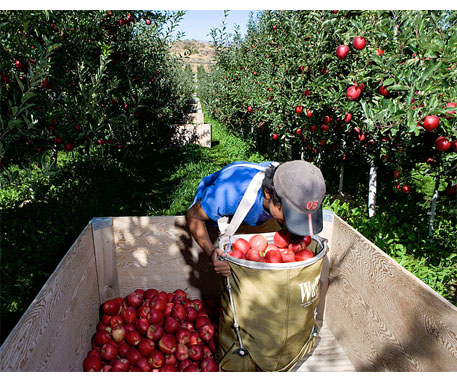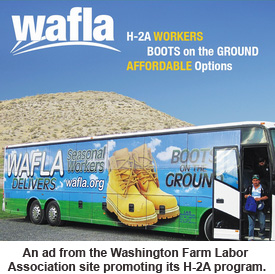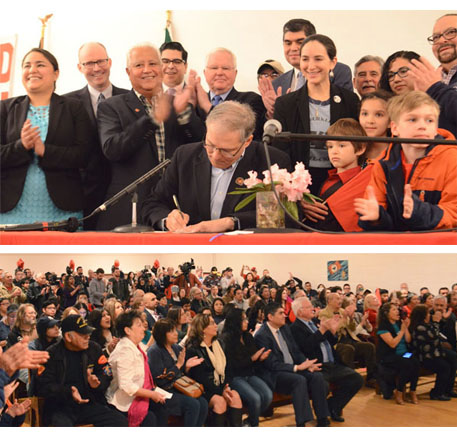STATE GOVERNMENT
State to feds: Don’t slash farmworker wages
 OLYMPIA (July 31, 2018) — Washington’s apple industry has been pressuring both the Washington State Employment Security Division (ESD) and the federal Department of Labor (DOL) to lower harvest wages between $4-6 per hour for the upcoming 2018 apple harvest. But after a state agriculture lobbying group bragged that its manipulation of apple harvest survey data would “save the apple industry millions” in lower wages, the state ESD has announced it is re-submitting that data and requesting that the DOL reinstate higher piece-rate wages for farm workers.
OLYMPIA (July 31, 2018) — Washington’s apple industry has been pressuring both the Washington State Employment Security Division (ESD) and the federal Department of Labor (DOL) to lower harvest wages between $4-6 per hour for the upcoming 2018 apple harvest. But after a state agriculture lobbying group bragged that its manipulation of apple harvest survey data would “save the apple industry millions” in lower wages, the state ESD has announced it is re-submitting that data and requesting that the DOL reinstate higher piece-rate wages for farm workers.
For decades, apple growers have paid piece-rate wages — an incentive-based system based on the number of bins filled — whereby an average farm worker earns about $18 an hour and the fastest pickers can earn more than $20 an hour. If the agriculture industry’s efforts to eliminate consideration of piece-rate wages succeeds, the DOL will allow growers using the H-2A program to lower wages for foreign and local workers to just over $14 an hour — a massive, painful pay cut for farm workers’ families, who make an average $27,000 a year, with no access to overtime pay.
Each year, ESD gathers wage data to set harvest wages for workers employed under H-2A contracts, the federal program that allows agricultural employers to hire foreign workers if there is a certified labor shortage. ESD and DOL are legally responsible for protecting the wages and working conditions of farm workers from being depressed by the hiring of vulnerable foreign H-2A workers.
Although each wage survey conducted since 2007, including the 2017 survey, has demonstrated that piece-rate wages are the norm during apple harvest, apple industry lobbyists have pressured the agencies to throw out last year’s survey results. On their behalf, a University of Washington statistician claimed that approach “cannot be justified on scientific grounds.” If the wage survey data is discarded, apple harvest wages will default to $14.12 per hour — the minimum wage for H-2A contracts in Washington state.
 WAFLA, a Washington corporation that recently generated $7.7 million in revenues charging member growers to help them navigate the H-2A program to import foreign workers, sent a June 29 email entitled “Big Win for H2 Apple Growers” lauding WAFLA’s lobbying efforts: “[ESD] agreed… [to] remove all piece rates for apple growers that utilize the H-2A program. This is a huge win and saved the apple industry millions. Really glad we could help.”
WAFLA, a Washington corporation that recently generated $7.7 million in revenues charging member growers to help them navigate the H-2A program to import foreign workers, sent a June 29 email entitled “Big Win for H2 Apple Growers” lauding WAFLA’s lobbying efforts: “[ESD] agreed… [to] remove all piece rates for apple growers that utilize the H-2A program. This is a huge win and saved the apple industry millions. Really glad we could help.”
But now, in a July 26 letter from the ESD to the DOL, the state agency said that it would be re-submitting apple harvest survey data and requesting that the federal agency reinstate higher piece-rate wages for farm workers. The DOL is conducting a final review before deciding whether to approve the deflated wages.
“The agricultural industry’s own data shows farm workers earn significantly more money on piece-rate wages than on the $14 hourly rate,” said Joe Morrison, a lawyer with Columbia Legal Services in Wenatchee. “We applaud the State of Washington’s efforts to protect wages for farm workers and their continued use of both grower and worker data to ensure statistically valid survey results. We call on the U.S. Department of Labor to accept Washington state’s revised apple harvest wage data to protect farm worker families who perform back-breaking labor essential to our state and national economy.”
Washington currently brings in more than 20,000 foreign H-2A workers, with that number increasing annually. Some of Washington’s largest and most powerful apple growers — Zirkle, Washington Fruit, Stemilt, and Gebbers — are WAFLA client-farmers and participate in the H-2A program. They could take advantage of the drastic wage reduction from discarding piece-rate data, causing thousands of farm workers to suffer huge financial losses. Employers outside the H-2A program could also reduce their wages to avoid competitive harm from lower-paying growers.
 “Governor Inslee recently traveled to a Yakima union hall packed with farm workers to sign into law a bill that recognizes March 31 as Cesar Chavez Day,” said Eric González, Legislative and Policy Director of the Washington State Labor Council, AFL-CIO. “Cesar Chavez would roll over in his grave if the federal government were to allow farm workers’ wages to be drastically cut in Washington state at the behest of the agricultural industry. Kudos to the state Employment Security Department for trying to do the right thing here.”
“Governor Inslee recently traveled to a Yakima union hall packed with farm workers to sign into law a bill that recognizes March 31 as Cesar Chavez Day,” said Eric González, Legislative and Policy Director of the Washington State Labor Council, AFL-CIO. “Cesar Chavez would roll over in his grave if the federal government were to allow farm workers’ wages to be drastically cut in Washington state at the behest of the agricultural industry. Kudos to the state Employment Security Department for trying to do the right thing here.”
WAFLA previously tried to eliminate higher piece-rate wages in 2015 when it openly encouraged growers to submit inaccurate wage data on their annual wage surveys. At that time, WAFLA’s executive director, Dan Fazio, told growers: “[W]e want to encourage you to be smart and strategic in your answers to help yourself and the other people in your industry.” ESD had to remove the tainted survey data and restore higher piece-rate wages after an ESD report found that WAFLA’s “guidance” resulted in growers providing wage data at odds with data provided in previous years.
“Agricultural employers have a long history of trying to hire vulnerable foreign workers at wage rates that U.S. farm workers cannot afford to accept,” said Bruce Goldstein, President of Farmworker Justice, a national farm worker advocacy group based in Washington, D.C. “The H-2A agricultural program law contains modest labor protections to prevent employers from displacing U.S. workers and adversely affecting the wage rates of U.S. workers. The State of Washington and the U.S. Department of Labor should not allow themselves to be manipulated into slashing the required minimum wage rate under the H-2A program.”
Farm workers and advocates have long raised widespread concerns with the H-2A program since H-2A temporary workers have fewer rights than domestic farm workers, are tied to a single employer, have no path to legal immigration status, and are vulnerable to abuse and mistreatment.





